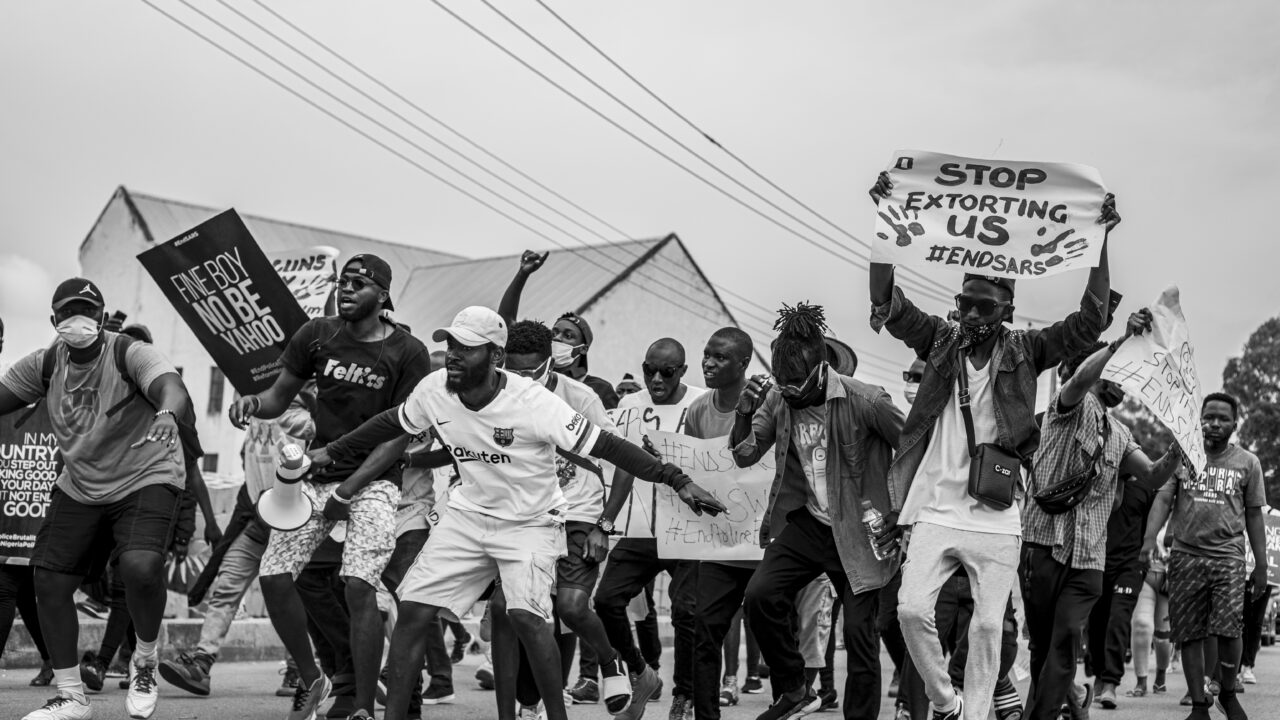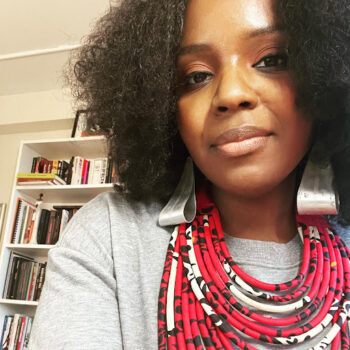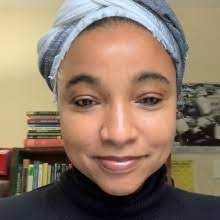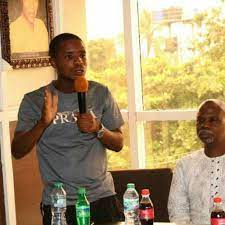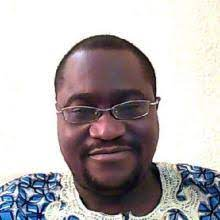We are four organizers based in Nigeria, Switzerland, the United States, and Canada, who are members of the Pan-African Activists Solidarity Collective, a space for Black organizers to share organizing strategies, tactics, and approaches that formed in response to the #EndSARS uprising in Nigeria in October 2020. In this article, we use the example of our collective to examine transnational and intergenerational movement building. Our experiences mobilizing a transnational #EndSARS solidarity effort show the critical role social media and digital technology can play in amplifying burgeoning and politically vulnerable struggles. However, we need to develop more advanced strategies that anticipate state suppression and resource gaps between the Global South and North. Deeper intergenerational ties must also be forged across struggles in order to build the interpersonal relationships, trust, and comradeship necessary to nurture the spirit and praxis of solidarity that has sustained centuries of Black liberation movements.
The 2020 #EndSARS uprising
Nigeria has an entrenched culture of state violence and impunity stemming from decades of military rule. The Nigerian Security Forces, compromising the military, police, and domestic intelligence agencies, function to protect the ruling class and are notorious for human rights abuses, excessive force, and attacks on civilians. Formed in 1992 as a response to a spike in armed robberies, the Special Anti-Robbery Squad (SARS) has become the most egregious of the 14 units of the Nigeria Police Force. A 2020 Amnesty International report documented 82 horrifying cases of SARS brutality between 2017 and 2020, including torture, forced confessions, extortion, sexual violence, and extra-judicial killings.
The hashtag #EndSARS first appeared in December 2017 after news of a police murder went viral. Over the next three years, activists in a few large cities organized small-scale #EndSARS protests, and more than 30,000 people signed an online petition calling for a public inquiry and police reform. On October 3rd, 2020, a SARS officer shot a young man in front of a hotel in the town of Ughelli, then fled in the victim’s Lexus SUV. Yet another viral case of police violence—just days after Nigeria marked 60 years of independence—provided the spark for a massive movement.
Over the following weeks, #EndSARS protests would grow to become the biggest protest movement in Nigeria in recent decades, mobilizing millions of Nigerian youth across the country and around the world to rise up against police brutality and state-sponsored violence. By October 8th, protests had erupted across the country. The next week, the hashtag recorded more than 48 million global tweets, and #EndSARS protests were organized in Canada, the UK, the US, Germany, Ireland, Hungary, and South Africa. Protest formations developed in cities and towns across 28 of Nigeria’s 36 states, each creating their own infrastructure, including volunteer squads for clean-up and distribution of donated goods and services, such as food, water, ambulances, and security. Most of the protesters were young. For many, the #EndSARS protests were their first experience of direct action. Still, the breadth of the movement—with its large, decentralized grassroots base—made it powerful. Many of us believed that it would be able to withstand suppression and cooptation by the Nigerian state.
But in October, the police began attacking, dispersing, and even killing protestors at actions across the country. On the 20th, the world watched via Instagram Live as the military opened fire on thousands of peaceful youth protesters at Lekki tollgate, killing at least 12 and injuring dozens more. Over the next few days, federal and state governments announced curfews and banned further protest.
In the wake of the government’s violent repression of the movement, the non-violent mass demonstrations that characterized #EndSARS prior to October 20th gave way to a more violent phase of uprising characterized by looting, property destruction, and even public lynchings of police officers. Thousands of youth burned down buildings and attacked police stations and media outlets. Protestors seized and redistributed Covid-19 food relief the government was hoarding in warehouses. Dispirited by flagrant state suppression of the movement and delegitimized by the perception that the protests were being overrun by “hooligans,” frontline organizers called for protesters to stay at home.
As the 2020 #EndSARS rebellion ran its course, solidarity played an important role in amplifying and resourcing the movement. We turn now to our experiences and lessons learned from developing a transnational #EndSARS solidarity campaign.
Organizing a Transnational Response
At the onset of the #EndSARS protests, we were each organizing on different fronts. Krystal, a core organizer with Black Lives Matter Philly, was coming out of months of sustained abolitionist street protest and grassroots organizing following the murder of George Floyd by Minneapolis police. Nanre had also spent the summer and fall on the streets in a small town in central Pennsylvania, organizing for Black lives through a local organizing front called the 320 Coalition. Baba Aye was helping to organize the Revolution Now campaign for the revolutionary socialist Pan Africanist Coalition for Revolution (CORE) from his home in Geneva, Switzerland. Juwon was organizing on the ground in Nigeria as the national coordinator for the international pro-democracy TakeItBack (TIB) Movement. Just out of detention in the fall of 2020, he had quickly mobilized the group’s national structures to join the #EndSARS movement in Lagos.
Nanre and Krystal had already begun talking about how Black organizers outside of Nigeria could support the struggle. We called a meeting of our organizing networks in Nigeria and North America for October 21st, not knowing that the Lekki Massacre would transpire the day before. During the Zoom call, which brought together about 25 organizers representing 10 organizations, Nigerian activists shared how their spirits had been broken by the massacre, and how the government was cracking down on internet access and cell phone service in its wake. They expressed the urgent need to build international pressure in response to the suppression of the movement. As one of the young Nigeria-based activists noted during this first meeting:
I think there’s a need for the Nigerian protest to have a template and work with it. The honest truth is there is a lot of unrefined energy around here. No experience. We just know we’re angry, but the movement needs structure.
We determined that we should focus our efforts on galvanizing international solidarity and awareness around the #EndSARS struggle and providing direct tactical support to protesters on the ground in the form of leadership development. What it would look like not just to amplify #EndSARS but to share experiences, strategies, and resources that could strengthen the movement in a moment of vulnerability? In practical terms, we committed to activist-to-activist conversations with a focus on anti-imperialism, state violence, and grassroots movement-building; the creation of accessible political education materials; and tangible forms of mutual aid such as raising funds for mobile airtime for Nigerian activists so they could more readily participate in virtual meetings, which required reliable internet access. We also raised the possibility of an international day of action, in-person town halls, and an online discussion series.
One of the immediate challenges we negotiated in advancing our transnational solidarity efforts was the pitfalls of not being physically present with one another. Though most of us had grown accustomed to virtual meetings and digital organizing over the course of the year, the Pan-African Activists Solidarity Collective was largely a group of strangers from around the world. We had never organized together and, thus, had not yet developed the intimacy and comradeship needed to sustain movement momentum and relationships.
We were also wary of conflating our different organizing experiences on the African continent and throughout the African Diaspora. For example, we realized early on that, while calls to defund or abolish the police had gained momentum in the US, in Nigeria, the police are already underfunded and ill-paid. Organizers there were more invested in reform than abolition.
Like many organizers, we relied on digital tools to mitigate these challenges. Closed network communications, such as WhatsApp, Zoom, and Signal, became critical information sources, coordinating tools, and mobilizing platforms for those being surveilled on public platforms. These tools — along with social media — also helped us amplify the #EndSARS struggle and the needs of Nigerian protesters globally. Immediately after our initial convening, we formed an #EndSARS Solidarity WhatsApp group and began planning a virtual webinar, which would later become an activist-centered discussion series called the Pan-African Activist Sunday School. This first event, titled “From Protest to Movement: Intro to #EndSARS and the History of Activism in Nigeria,” was formatted as a digital teach-in with short speaker presentations, moderated questions, and text-based Q&A from viewers. Eight thousand viewers across Facebook, Twitter, and YouTube tuned in to the live-streamed event.
While our use of digital platforms helped to galvanize transnational solidarity, it also raised questions about the potential disconnect between the virality of the movement online and the realities for grassroots protesters and activists struggling to keep the movement alive on the ground. Though the #EndSARS hashtag continued to trend after the Lekki Massacre — especially once global cultural influencers like Rihanna and Beyoncé tweeted their solidarity — many activists were arrested and brutalized for participating in protests. Hundreds of protesters were also reported missing, detained, or hospitalized without any official record; visible leaders of the movement had their bank accounts frozen and their passports seized. More than a year later, victims are still seeking justice, and public accountability for the Lekki Massacre and other government abuses during the uprising is lacking, as the government continues to deny responsibility. Many organizers have fled the country. People around the world expressed their solidarity through the blanket call to #EndSARS, but the government suppression that followed the Lekki Massacre was lost in translation on digital platforms.
We also struggled to overcome the deep technological divide between organizers in the Global North and South. Due to unstable electricity and exorbitant rates for internet access — a reality for many throughout the Global South — comrades in Nigeria frequently had difficulty connecting to our online sessions and so could not participate fully during our internal organizing calls or public forums like the Sunday School.
These sobering realities point to the ways transnational solidarity efforts urgently need to adapt and grow if they are to be successful beyond hashtags or viral videos. Within our collective, we have sent mobile data to comrades struggling to access the internet. We are also thinking about broadening access to our public activist forums through online radio broadcasts, audio-only downloads, and text transcripts. Moving forward, we have plans for a mutual aid fund that our better-resourced member organizations will contribute to on a regular basis to ensure the full participation of all members regardless of location. When the Nigerian government froze the bank accounts of #EndSARS support organizations and restricted international transfers, some groups turned to cryptocurrency to resource protests. Such concrete strategies for resourcing protests and for bail and jail support are needed at the transnational level before the rebellion begins.
Revitalizing Legacies of Intergenerational Organizing
During the #EndSARS rebellion, chasms quickly emerged between young Nigerian organizers on the front lines and older activists, including labor union leaders, who refused to support the protests and even mocked young people’s zealousness. Many #EndSARS protesters were young people without previous organizing experience; they were distrustful of unions and an older generation that they felt had failed them. They were especially skeptical of civil society organizations that they saw as corrupt and part of the establishment. Older activists and union organizers, they complained, had only joined the #EndSARS movement once it had taken off. For their part, many older activists felt that young people did not recognize the sacrifices of previous generations and were not grateful or humble enough to learn from them. These generational divides have a longer history. The youth-led Occupy Nigeria struggle that formed in January 2012 to protest the removal of a government fuel subsidy, which drastically increased fuel prices, was betrayed by labor leaders, who colluded with the government to end the mass protests. Due to this history, #EndSARS protesters rallied around the slogan “We Have No Leaders.”
These intergenerational divisions are symptomatic of decades of suppression of radical movements in Nigeria. Intergenerational political relationships once strengthened youth-led movements against colonial, military, and civilian regimes, as the history of the National Association of Nigerian Students’s collaboration with labor and civil society groups in the 1980s and 90s shows. However, in the past two decades, these relationships have gradually deteriorated due to the long-term assault on the autonomy and power of student and faculty unions, the collapse of the left, and the rise of NGO-ism, which has put groups into competition with one another. Given this history, the Pan-African Activists Solidarity Collective prioritized intergenerational learning as core to our practices and shared values. We intentionally invited younger and older activists to join and contribute, acknowledging the value of different life experiences and movement knowledge within and across different generations.
The structure of our #EndSARS Sunday School is one example of this. The virtual teach-in began with Baba Aye and another movement elder, Ngozi Iwere, providing an overview of the history of social movements and organizing against police violence in Nigeria. This was followed by a rich, intergenerational conversation between the two seasoned comrades — both of whom began their activism as students — and three younger activists. The group discussed what the current #EndSARS protesters could learn from past struggles in Nigeria, as well as from other movements in Africa and throughout the Pan-African world. In this space of reciprocal learning and recognition, the movement elders could offer their experiences of the decline of the Nigerian left, share the ideological roots of contemporary movements, and express their concern that the #EndSARS struggle would be co-opted without a strong grassroots base grounded in a shared ideology. In turn, younger activists were able to communicate their generation’s politics and approach. Still, we were not always successful in navigating intergenerational conflict. Mediation once became necessary after seasoned activists based in the Global North publicly criticized the political tactics of younger organizers in Africa because of their affiliation with a popular leader, who was suspected of being co-opted by imperialists.
We continue to collectively struggle to sustain these conversations in public forums as well as away from public view. Our WhatsApp group is an active thread of conversation, event advertisements, and announcements concerning issues of social and political importance to Pan-African organizers, such as political campaigns, protests, or instances of state violence. We continue to look for new ways to support the more intimate, everyday work of deepening relationships among organizers via direct messages, voice messages, and calls and to develop the political coordination of our movements through regular updates and strategy sharing. While these digital tools have been indispensable to facilitating our continued contact across four continents, we are working toward an in-person convening on the African continent to strengthen these relationships further.
After the Streets Go Quiet, What’s Next?
Since our #EndSARS solidarity work began over a year ago, we have expanded our efforts beyond Nigeria to support burgeoning movements throughout the Pan-African world, including in Uganda, Ghana, South Africa, Haiti, Colombia, the United States, Europe, and Palestine. With the Pan-African Activist Sunday School as our key public-facing programming, our broader intention is to continue deepening our political relationships with each other as comrades and among an ever-growing number of revolutionary organizations and movements which struggle against state violence, imperialism, capitalism, and white supremacy and for the liberation of Black people. We are now composed of roughly 75 organizers representing dozens of frontline organizations connected to four continents — all committed to building power across our movements through political education, collaboration, and direct solidarity work.
Through our #EndSARS solidarity work and the Pan-African efforts that have followed, we have realized the importance of building and consolidating our relationships with other activists — both within the quiet murmurs of day-to-day organizing and the loud bangs of national and international calls to global action. We embrace the euphoria that exists when tens of thousands rush to the streets while recognizing that, when the dust settles, we organizers will still be here — or as we say in Nigeria, na we dey here (we are the ones that are/stay here). When moments and openings like #EndSARS emerge, we hope that the wave of popular protests will advance our dreams of a just global society that respects Black life, but we are not deceived to think that this is an inevitable outcome.
At the core of this work is building and sustaining deep ties across generations and throughout the Pan-African world. Intergenerational organizing is important not only for its utility to present movements but also because it helps us understand the permanence of struggle, which should humble all of us who seek, with a great sense of urgency, to transform the world. A generation of activists and organizers has gone before us, paving the way with far less organizing tools at their disposal. We ground ourselves in the traditions of Pan-African solidarity, knowing that despite our challenges, our hope remains unshaken.
